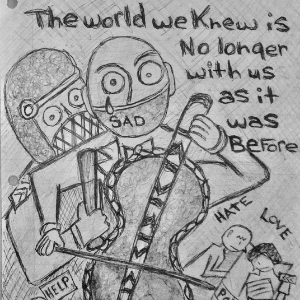 A Reflection for the Tuesday of the Fifth Week of Lent
A Reflection for the Tuesday of the Fifth Week of Lent
The eighth chapter of John’s gospel, from which the lectionary draws this week, is difficult to read. The polemic between Jesus and his opponents, “the Jews” (read: some of the religious leaders), reaches a bitter impasse.
Reading between the lines of this polemical exchange, we can find Good News about who Jesus is and the purpose of his mission. Jesus refers to the “lifting up” of the Son of Man, meaning his crucifixion. Not only will Jesus be raised up on the cross; he will also be exalted because on the cross he will fulfill the mission for which he was sent: to reveal the utter immensity of God’s love.
Jesus upends all expectations as he makes known the unimaginably gratuitous nature of divine love. Psalm 102 proclaims: “The Lord looked down from his holy height, from heaven he beheld the earth, To hear the groaning of prisoners, to release those doomed to die.” When the Word became flesh, God not only looked down but even came down from heaven to earth. Deeply moved with compassion, God came to dwell among us, humans and fellow creatures, all doomed to die. Love lured God down to free us from the fear of death.
Jesus’s coming into the world does not do away with death or the evils that destroy life. Rather, by dying and rising to new life, Jesus overcomes everything that separates us from the love of God. All creatures suffer evil and death, but that suffering cannot destroy us. Even in the grip of death, we can experience healing and liberating grace.
The cross on which Jesus was crucified proved an instrument of humiliation, torture, and state-sponsored execution. Yet it becomes for believers a sign of God’s will to give life to the world. The divine love that sustains all Creation is made manifest even on Calvary, the place of death.
I see the saving power of life and love revealed today through our sisters and brothers impacted by incarceration. I am privileged to edit a creative arts publication that showcases poetry and drawings by incarcerated persons in Illinois. U.S. prisons are the Golgotha of our times—the visible manifestation of systemic racism and its evils. Yet these poets and artists have transformed their prison cells into studios, reading rooms and writing labs. From within institutions structured to deny their dignity, they create beauty and speak words of truth. Their resilience testifies to the gift of life and the enduring power of love.
In the remaining week of Lent, I encourage you to look at this country’s system of mass incarceration through the artwork of our sisters and brothers in bondage. May their voices move our hearts to compassion, remembering Jesus’s mission to set prisoners free. We pray for a national conversion to restorative justice practices that would liberate our whole society from the bonds of racism, sin and death.
Drawing is by formerly incarcerated artist David Rivera. David is a contributor to the creative arts publication that Annie edits. The first issue is forthcoming.

 Annie Killian '11 '16 M.A. '19 Ph.D.
Annie Killian '11 '16 M.A. '19 Ph.D.


